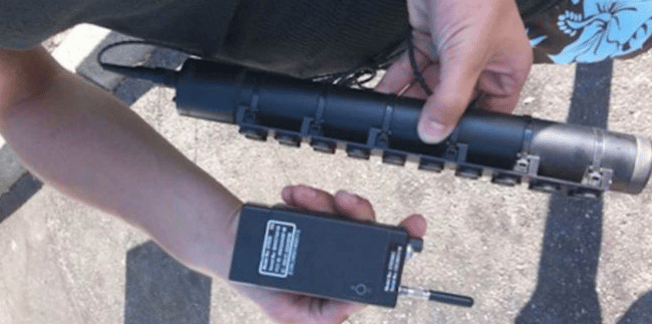Warrick County, IN — What would you do if you found a creepy device attached to your car that looked like something used to track you? Would you simply leave it there and go on about your business? Or, would you remove it? Well, a man in Indiana chose the former and removed it. It turned out to be a GPS tracker and because it was placed their by police, this man is now being charged with theft. He’s now fought his case all the way to the state Supreme Court.
Since 2012, it has been unlawful for police departments to attach GPS tracking devices to vehicles without first obtaining a warrant, thanks to a ruling by the US Supreme Court. Despite outlawing warrantless applications of GPS trackers, TFTP has reported on several cases in which this still happens. However, this is not one of them. The Warrick County Sheriff’s Office legally obtained a warrant and placed a GPS tracker on Derek Heuring’s car in July of 2018.
The Warrick County Sheriff’s Office suspected Heuring of being drug dealer, so they began tracking his every move. But after a week, Heuring discovered the GPS device and removed it.
According to court documents,
One week later, the GPS device stopped signaling its location. When police went to retrieve the device from Heuring’s vehicle, it was missing. Police obtained a search warrant for Heuring’s residence, alleging that there was probable cause to believe he had committed theft of the device.
Police did find the device inside Heruing’s home. They also found methamphatamine and drug paraphernalia. He was subsequently charged with dealing meth and theft of a GPS device. After his arrest, Heuring moved to have the evidence suppressed citing the illegal nature of the search because police never had probable cause to ever believe there was a theft.
Heruing’s defense argued that the device could’ve simply fallen off or malfunctioned. Even if he did “steal” the device, it was on his property and he couldn’t have known for sure that it belonged to the government. As Arstechnia points out:
It wasn’t exactly labeled as the property of the Warrick County Sheriff’s Office. Most important, it’s not clear that taking an unwanted device off your car is theft—even if you know who it belongs to.
Unfortunately for Heruing, the Warrick Superior Court denied Heuring’s motion to suppress evidence recovered from the searches. On an interlocutory appeal, the Court of Appeals affirmed the denial of the motion to suppress. Now, his case is going before the highest court in the state and it seems he may have some justices on his side.
“I’m really struggling with how is that theft,” said Justice Steven David during recent oral arguments.
“If somebody wants to find me to do harm to me and it’s not the police and they put a tracking device on my car and I find a tracking device and I dispose of it after stomping on it 25 times, I would hope they would not be able to go to a local prosecutor and somehow I’m getting charges filed against me for destroying someone else’s property,” Justice David said.
However, the state disagrees — and is applying a double standard. The government concedes that if a private party did put a GPS tracking device on your vehicle, it would not be theft to remove it. But since they are the almighty state, it doesn’t work that way with them — you’re just supposed to know it’s the state’s and leave it be. By removing it and preventing tracking, Heuring was depriving the government of the use of its property — even if he didn’t know it was the government’s GPS device.
If Heuring successfully argues his case before the state Supreme Court, he could successfully beat the theft charges for the GPS as well as the meth dealing charges. The court is still considering the case which could be precedent-setting in nature.
As mentioned above, the state putting GPS trackers on people’s cars is surrounded in controversy. As TFTP reported, Silicon Valley resident Yasir Afifi discovered an FBI tracking device on his car when he took it for an oil change. Alarmed and curious about what it might be, Afifi posted photos of the device online, asking members of Reddit whether it was a bomb, or possibly an FBI tracking device.
Afifi soon learned the source of the device when he was visited by a large group of FBI agents who had seen his posts online, and wanted their device back. The FBI took their device and never mentioned why it was on this innocent man’s car, nor whether or not they had a warrant.
When they aren’t being used to track innocent computer scientists in Sillicon Valley, police are using GPS trackers to spy on their political opponents. In 2014, local Councilmen Jim Righeimer, Stephen Mensinger and Gary Monahan were targeted by police unions because they had a number of political disagreements, specifically in regards to police budgets.
A lawsuit that was later filed by Righeimer and Mensinger, claiming private detectives, working on behalf of the local police unions and their partner law firm, planted a GPS device on Righeimer’s car and attempted to have him wrongfully arrested for driving under the influence. It would eventually be proven and former police officers Chris Lanzillo and Scott Impola were charged with illegal use of a tracking device, false imprisonment by deceit, conspiracy to commit a crime and falsely reporting a crime.
Reprinted from the Free Thought Project.































